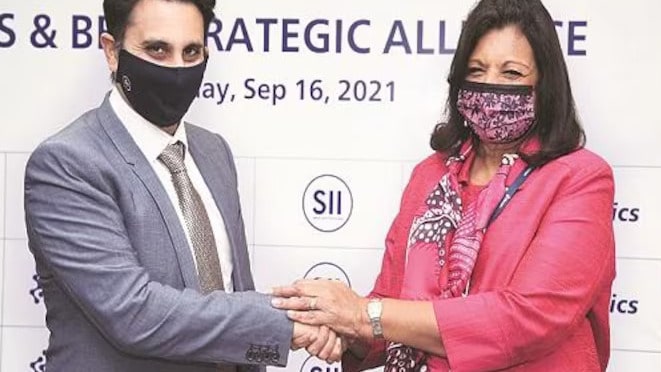Serum Institute of India and Biocon Biologics, two of India’s leading pharmaceutical companies, have announced a new equity investment framework that aims to bolster the country’s vaccine and biopharmaceutical industry.
The partnership, which was unveiled on Monday, will see Serum Institute invest up to $300 million in Biocon Biologics, giving the Pune-based firm a minority stake in Biocon Biologics.
Biocon Biologics, which is a subsidiary of Biocon Limited, one of India’s largest biopharmaceutical companies, is focused on developing and manufacturing biosimilars, a class of biologic drugs that are designed to be highly similar to existing approved biologic drugs.
The new investment framework will enable Biocon Biologics to accelerate its research and development efforts and expand its global manufacturing footprint. The two companies will also explore opportunities for collaboration in areas such as clinical development, regulatory filings, and commercialization of their respective products.
Speaking about the partnership, Adar Poonawalla, CEO of Serum Institute of India, said, “We are delighted to partner with Biocon Biologics, one of India’s leading biopharmaceutical companies, to help build a more robust biopharmaceutical ecosystem in the country. This investment will enable Biocon Biologics to further strengthen its R&D capabilities and expand its global manufacturing footprint, which will ultimately benefit patients worldwide.”
Kiran Mazumdar-Shaw, Executive Chairperson of Biocon Limited, said, “This partnership with Serum Institute of India will enable us to fast-track our journey towards achieving our aspiration of serving 5 million patients through biosimilars. We look forward to collaborating with Serum Institute of India to address the growing global demand for high-quality and affordable biologics.”
The partnership comes at a time when the global demand for vaccines and biopharmaceuticals is at an all-time high due to the ongoing COVID-19 pandemic. The Serum Institute of India, which is the world’s largest vaccine manufacturer by volume, has been at the forefront of efforts to ramp up global vaccine production.
In January 2021, the company launched the Covishield vaccine, which is a version of the AstraZeneca vaccine that was developed in collaboration with the University of Oxford. The vaccine has since been authorized for emergency use by the World Health Organization (WHO) and is being used in several countries around the world.
Biocon Biologics, on the other hand, has been working on developing biosimilars for the treatment of diseases such as cancer, autoimmune disorders, and diabetes. The company currently has a portfolio of 11 biosimilars that are being marketed in various countries around the world. It is also engaged in the development of multiple projects, including biologics for rare and orphan diseases. In addition to this, Biocon has a strong R&D focus and is working on more than 20 biosimilar programs that are in various stages of clinical development.
The new equity investment framework will enable the two companies to combine their expertise and resources to further accelerate the development and production of high-quality biopharmaceuticals, including biosimilars and vaccines.
The partnership is also expected to create new job opportunities in the biopharmaceutical industry in India, which is already a significant contributor to the country’s economy. The Indian pharmaceutical industry is currently valued at around $40 billion and is expected to grow at a CAGR of 11.5% between 2020 and 2025. This growth is expected to be driven by increased spending on healthcare, the rise of new and innovative drug therapies, and an expanding base of customers.
In conclusion, the new equity investment framework established by Serum Institute of India and Biocon Biologics is expected to have a significant impact on the global biopharmaceutical industry. The partnership will enable the two companies to combine their resources and expertise to develop and manufacture high-quality biopharmaceuticals that will benefit patients worldwide. It will also create new job opportunities and contribute to the growth of the Indian pharmaceutical industry, which is a key player in the global healthcare sector.










